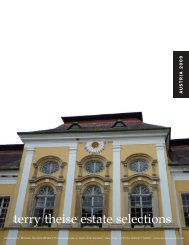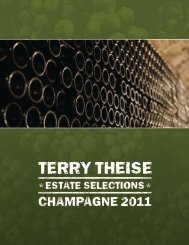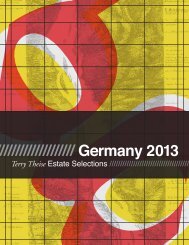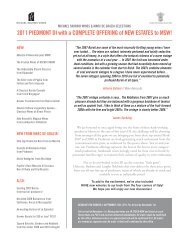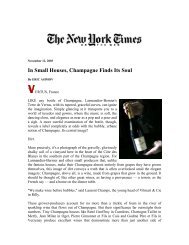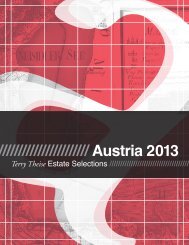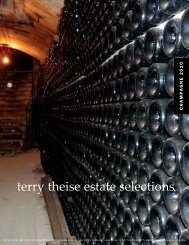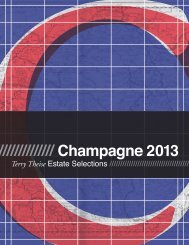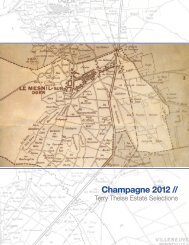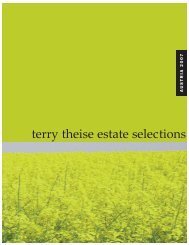German Catalog 2006 USE THIS ONE.qxp - Michael Skurnik Wines
German Catalog 2006 USE THIS ONE.qxp - Michael Skurnik Wines
German Catalog 2006 USE THIS ONE.qxp - Michael Skurnik Wines
Create successful ePaper yourself
Turn your PDF publications into a flip-book with our unique Google optimized e-Paper software.
In the years that followed I have tried to reduce that<br />
infatuation to whatever unblinking truth lies beneath it.<br />
It isn’t easy.<br />
Sigrid Selbach told me a story one year. “We picked<br />
our Eiswein last year on Christmas Day,” she began. “The<br />
day before, when we realized the weather might permit us<br />
to gather the grapes the morning of Christmas, we were<br />
hesitant to call and ask for help with the picking. But you<br />
know, we called twelve people, and they all agreed to help<br />
us, and they were all cheerful to do it. We went out into<br />
the vineyard before dawn to check the temperature, then<br />
phoned them at 6:00 a.m. on Christmas morning, and they<br />
all came, and all of them were in a good mood. Afterwards<br />
they gathered here at the house for soup and Christmas<br />
cookies. And when they left they were all singing out<br />
“MERRY CHRISTMAS!” as they went home to their families.<br />
Isn’t that wonderful?”<br />
It’s more than wonderful. It literally amazes me that<br />
people would cheerfully agree to get out of their warm<br />
beds before dawn on Christmas morning, leaving their<br />
families, to go out and gather enough fruit for a few cases<br />
of wine that nobody makes any money on. Can you hear<br />
such a story and still doubt that angels walk among us?<br />
Stories like the Eiswein harvest signify more than<br />
neighborliness, or even esprit de corps among fellow<br />
vintners. It is simply taken for granted that certain traditions<br />
are ennobled by observing them with love and<br />
good cheer. When you have a chance to gather an<br />
Eiswein it is beneficence from heaven; you CELEBRATE<br />
the opportunity.<br />
I have two Mosel producers who are neighbors in<br />
the same site; their parcels are contiguous. One producer<br />
hadn’t quite finished picking when their Polish workers’<br />
work-visas expired, which meant the crew had to return<br />
to Poland. No problem, said the neighbor; we’ll pick for<br />
you. We’ll pick for you. It really is another world. People<br />
may know one another for twenty years and still address<br />
each other as Herr-This and Frau-That. But we’ll pick for<br />
you. There is a certain baseline kindness here, I find<br />
myself thinking, a certain understanding of neighborliness.<br />
And it is without affect; it seems to come quite naturally.<br />
It strikes my American ears, so used to hearing<br />
platitudes and boilerplate about neighborliness, citizenship,<br />
fellow-feeling, that this is the real thing. Oh believe<br />
me, they have their problems and jealousies and all the<br />
ratty bullshit which can possibly exist among people,<br />
but—we’ll pick for you.<br />
Being a vintner along the Mosel signifies membership<br />
in a human culture much deeper than mere occupation.<br />
Nonetheless, there are many ways to be a citizen of<br />
this culture; one might be lazy, content with mediocrity;<br />
one might be merely diligent, competent and dutiful. Or<br />
one might be conscientious and nurturing. And one’s<br />
wines flourish under such nurturing. They are vital, for<br />
they exhale back the love that’s been breathed into them.<br />
This may seem abstruse to the “consumer” but there are<br />
many ways to consume, and many things to be consumed<br />
in a glass of wine. You can see the wine merely as an<br />
Object, and assess it “against” its “competitors” using<br />
some arbitrary point-system you have chosen.<br />
Or you can drink something that tells you it was<br />
made by human beings who want to show you the beauty<br />
and meaning they have found in their lives. You<br />
choose.<br />
Part of the Selbach’s aesthetic is the eschewing of<br />
anything confected in the wines. Mosel wine is more a<br />
matter of its internal skeletal makeup, and from that<br />
instinct for structure come all the judgements and preferences<br />
which constitute a house-style. Thus fruit must<br />
also be structured, detailed, and defined, and the overall<br />
effect of the wines should be as bracing as a leap into a<br />
cold pond on a hot day. Hans Selbach once advised a colleague<br />
not to select too stringently at harvest. Better to<br />
leave a few of the underripe grapes in the bunches. They<br />
give structure to the wine.<br />
Tasting the wines of Papa Hans Selbach’s era, one is<br />
always struck by how vigorous they are, how ageless.<br />
One is also struck by their lack of affect; they never try to<br />
seduce with their prettiness. They are upright, firm in<br />
posture, correct, impeccable.<br />
Johannes was raised with these wines and he had no<br />
desire to alter them. What he did do was to build upon<br />
them, to add a layer of sensuousness, to give just a little<br />
more warmth, a wider Julia-Roberts kind of smile. He did<br />
this with great tact and love, but I don’t suppose he ever<br />
deliberately sat down and plotted it all as a STRATEGY,<br />
nor ever said “I must do this with great tact and love.”<br />
The results are some of the deepest of all Mosel<br />
wines. They refuse to be merely aesthetic. They strive for<br />
(and often attain) a sine qua non of Mosel-ness. They take<br />
you through<br />
the gift-wrapping<br />
of mere<br />
flavor and they<br />
show you<br />
something you<br />
may not know<br />
how to see.<br />
Few wines<br />
— few things —<br />
take us to such<br />
places of faith.<br />
Selbach’s wines<br />
take me there<br />
frequently. You<br />
can’t identify<br />
that slippery little<br />
thing soul in<br />
wines by how<br />
they look, smell or taste. It’s how they make you feel. It is<br />
how deeply they peal and echo. It is how quickly they<br />
leave themselves behind and lead you elsewhere away<br />
from “wine.” Johannes told me that he wants “soul” in<br />
his wines, but I doubt if we mean exactly the same thing<br />
by it. Nor should we. The sincerity of his wish, the<br />
assumption of a value in wines of soul is part of what<br />
puts it there. The rest, I think we are not meant to know,<br />
but only to sense.<br />
47<br />
MOSEL WINES



